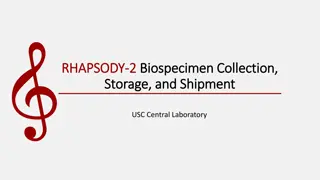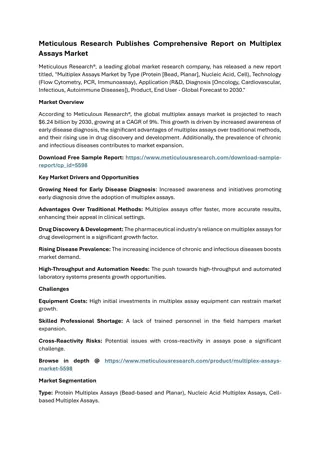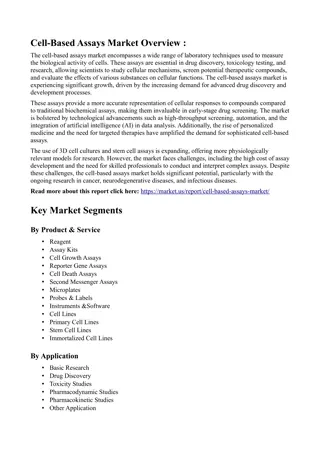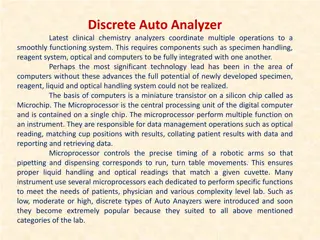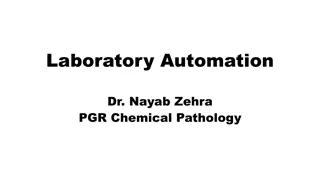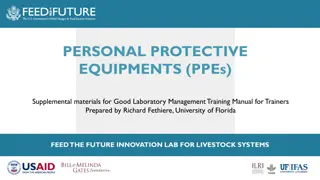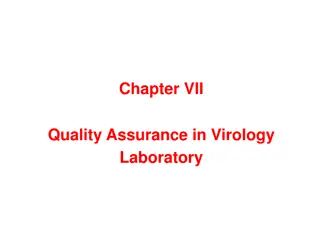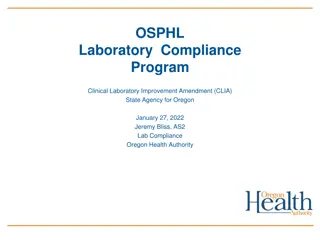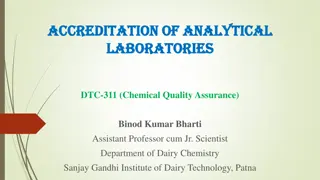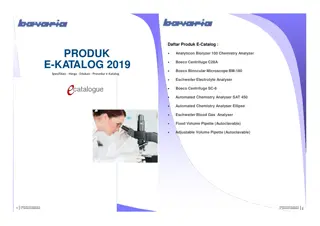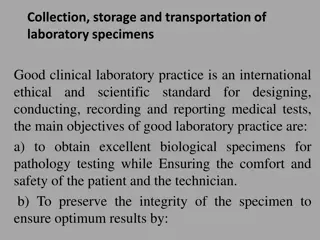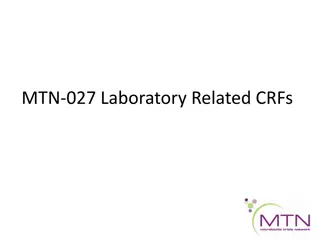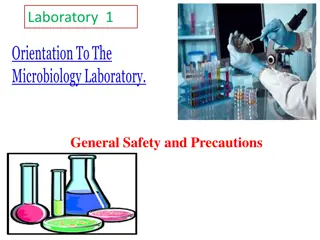Understanding Alinity i STAT High Sensitivity Troponin-I for Cardiovascular Diagnosis
Alinity i STAT High Sensitivity Troponin-I is a proprietary assay used in diagnosing myocardial infarction (MI) by quantitatively measuring cardiac troponin I in human plasma. This chemiluminescent microparticle immunoassay (CMIA) aids in the detection of MI, a significant aspect in managing heart d
2 views • 30 slides
History and Educational Programs of DEU Lab Animal Science Department
Established in 2004, the Department of Laboratory Animal Science at Dokuz Eylul University Institute of Health Sciences offers cutting-edge education focusing on animal welfare and ethical practices in scientific research. The department upholds the 3R Principle—Reduction, Refinement, Replacement�
0 views • 9 slides
Biospecimen Collection, Storage, and Shipment Overview at USC Central Laboratory
This overview covers the types of biospecimens collected, specimen collection schedule, supplies, protocols, and shipping instructions at the USC Central Laboratory. It includes details on whole blood collection for different assays, storage procedures, and shipment to USC Labs and Charles River Lab
0 views • 21 slides
Laboratory Material Quality Management Procedures
This detailed guide covers the comprehensive process management and quality control procedures for laboratory materials, including the life cycle of materials, purchase processes, vendor evaluation, reception and storage guidelines, and evaluation criteria. It emphasizes the importance of documented
1 views • 20 slides
Understanding Cell Viability Assays in Laboratory Testing
Cell viability assays play a crucial role in determining the health and status of cells, measuring their ability to survive and proliferate. These assays involve various techniques such as dye exclusion, colorimetric, fluorometric, luminometric, and flow cytometric assays. By assessing factors like
6 views • 16 slides
Effective Laboratory Management: Safety, Equipment Maintenance, and Inventory Control
This comprehensive training manual covers essential topics such as laboratory safety, equipment maintenance, supplies and reagents inventory, chemical inventory management, and material safety data sheets. It emphasizes the importance of proper procedures to ensure a safe working environment and eff
1 views • 19 slides
Protein Assays Market
Protein Assays Market by Type (Dye-based, Copper-based) Technology (Fluorescence, Absorbance, Colorimetric) Offering (Reagent, Kit, Instrument) Application (R&D, Drug Discovery, Diagnostics) End User (Pharmaceutical, Hospital) \u2013 Global Forecast to 2031\n
2 views • 4 slides
Optimizing Laboratory Billing Services, The Key to Efficient Healthcare Revenue Management
In the intricate web of healthcare management, laboratory billing services play a pivotal role. From accurately documenting procedures to ensuring compliance with complex insurance regulations, effective billing is essential for the financial health of laboratories and the overall healthcare system.
2 views • 8 slides
WHONET Training Course: Laboratory Configuration and Setup
Understanding the laboratory configuration process in WHONET is crucial for effective data entry and analysis. This module guides users on setting up a new laboratory, entering country and lab details, defining antibiotics, sample locations, and data fields, creating microbiological alerts, and savi
3 views • 57 slides
Streamlining Laboratory Billing Services, Key Benefits and Best Practices
In the fast-paced environment of medical laboratories, accurate and efficient billing processes are essential. Laboratory billing services are crucial in ensuring financial stability and compliance with healthcare regulations. This blog explores the benefits of professional laboratory billing servic
1 views • 7 slides
Meticulous Research Publishes Comprehensive Report on Multiplex Assays Market
Multiplex Assays Market by Type (Protein [Bead, Planar], Nucleic Acid, Cell) Technology (Flow Cytometry, PCR, Immunoassay) Application (R&D, Diagnosis (Oncology, Cardiovascular, Infectious, Autoimmune Diseases) Product, End User - Global Forecast to 2030\n
0 views • 2 slides
Enhancing Laboratory Billing Services with MedKarma, A Comprehensive Guide
In the dynamic healthcare landscape, laboratory billing services play a crucial role in ensuring smooth financial operations for medical laboratories. Effective billing practices not only streamline revenue cycles but also enhance overall operational efficiency. MedKarma, a leading provider of labor
2 views • 7 slides
Revolutionizing Laboratory Billing Services with Medkarma, Precision, Efficiency, and Transparency
In the ever-evolving healthcare landscape, laboratory billing services stand as a critical component in ensuring the financial health of diagnostic labs. The complexity of billing processes, coupled with stringent compliance requirements, demands a specialized approach. Medkarma, a leader in healthc
1 views • 7 slides
Understanding Cerebrospinal Fluid Analysis
Explore the essential aspects of cerebrospinal fluid (CSF) analysis, from routine laboratory assays to interpretation of pathological conditions. Learn about CSF formation, normal parameters, and interpretation of lab results to diagnose various neurological conditions.
0 views • 76 slides
Cell-Based Assays Market
According to a recent report by Market.us, the Global Cell-based Assays Market size is expected to be worth around USD 37.1 Billion by 2032 from USD 16.3 Billion in 2022, growing at a CAGR of 8.8 % during the forecast period from 2023 to 2032.\n\n
0 views • 3 slides
Advancements in Discrete Auto Analyzers for Clinical Chemistry Operations
Discrete auto analyzers integrate specimen handling, reagent systems, optical components, and computers for streamlined functionality. The innovation in computer technology, particularly microprocessors, has revolutionized these analyzers, enabling precise data management, liquid handling, and optic
0 views • 17 slides
Understanding Peroxidase Enzyme Activity in Biological Samples
Demonstrating the enzyme activity of peroxidase, an enzyme that plays a crucial role in breaking down hydrogen peroxide in various organisms. Learn about the differences between peroxidase and catalase, the calculation of enzyme activity, and the significance of extinction coefficient in enzyme assa
0 views • 8 slides
Laboratory Automation in Chemical Pathology: A Comprehensive Overview
Laboratory automation in chemical pathology involves the use of control systems to minimize human intervention and improve efficiency in conducting tests. The historical background, types of automation, benefits, total laboratory automation, and important considerations are discussed in detail.
1 views • 25 slides
Best Practices for Laboratory Safety and Management
Promoting a safe laboratory environment involves following safety codes and assigning responsibilities for practices like hazard awareness, equipment use, and PPE. Good laboratory practices include proper storage and handling of hazardous chemicals, with a focus on flammable, corrosive, reactive, an
3 views • 17 slides
Quality Assurance in Virology Laboratory
This chapter focuses on quality assurance in virology laboratory, covering topics such as quality control, documentation of test results, laboratory safety rules, and more. It explains the types of quality control, quality assurance cycle, and process areas of quality assurance in laboratory testing
3 views • 19 slides
Understanding CLIA: Ensuring Quality Laboratory Testing in Oregon
Describing the Clinical Laboratory Improvement Amendments (CLIA) program in Oregon, focusing on sustainable compliance for quality laboratory testing. Explains the purpose of CLIA, types of certifications, and requirements for laboratories. Highlights the role of the Oregon State Agency in administe
0 views • 13 slides
Understanding Laboratory Accreditation of Analytical Laboratories
Laboratory accreditation ensures third-party certification of testing and calibration competence, providing formal recognition to laboratories. This accreditation allows customers to identify reliable services and ensures laboratories maintain technical competence. Accreditation bodies use specific
1 views • 20 slides
Formalin Safety Guidelines in Anatomy and Physiology Laboratory
Formalin, a mixture of formaldehyde and water, is used in laboratories to preserve tissues. OSHA regulates exposure levels due to health risks. Proper ventilation and personal protective equipment are crucial to control exposure. The laboratory employs engineering controls and monitoring for safety.
0 views • 16 slides
Understanding Haemophilia: Current Knowledge, Future Perspectives, and the Kenyan Scenario
Haemophilia is a genetic disorder affecting 1 in 10,000 deliveries, with joint bleeds being a common presentation. Bleeding episodes into joints can lead to chronic issues like synovial hypertrophy. Laboratory evaluation involves APTT testing and factor assays, with treatment including factor replac
0 views • 19 slides
Laboratory Equipment E-Catalog 2019
Explore the E-Catalog featuring various laboratory equipment such as the Analyticon Biolyzer 100 Chemistry Analyzer, Boeco Centrifuge C28A, and Eschweiler Blood Gas Analyzer. View specifications, prices, education materials, and procedures for these advanced laboratory tools. The catalog includes es
2 views • 7 slides
Understanding Anticoagulants in Laboratory Hematology
Anticoagulants are crucial additives that prevent blood clotting during laboratory procedures. The commonly used anticoagulants include EDTA, sodium citrate, and heparin, each with specific concentrations, modes of action, and color-coded identifications. EDTA is ideal for blood cell counts, sodium
0 views • 6 slides
Achieving Comparable Results in Laboratory Practice
Good laboratory practice necessitates minimal error in measurement to reflect a patient's biological condition accurately, ensuring comparable and reliable results regardless of testing location or method. Standardization, harmonization, and traceability play crucial roles in achieving uniformity an
0 views • 29 slides
Best Practices for Clinical Laboratory Specimen Handling
Good clinical laboratory practice emphasizes the proper collection, storage, and transportation of laboratory specimens to ensure accurate and reliable test results. Key aspects include obtaining high-quality specimens, maintaining specimen integrity, and following standard precautions to prevent co
6 views • 6 slides
Global Cell-Based Assays Market
The Global Cell Based Assays Market Size is Anticipated to Exceed USD 35.42 Billion by 2033, Growing at a CAGR of 7.47% from 2023 to 2033.\n
1 views • 6 slides
Comprehensive Resources for Medical Laboratory Technicians
Extensive resources are available for medical laboratory technicians, including tutorials for evaluating health information, access to credible research libraries, and free professional publications. Specific resources cover phlebotomy techniques, hematology tutorials, blood banking procedures, and
1 views • 7 slides
Essential Laboratory Apparatus and Equipment for Sugar Processing Controllers
The analytical results obtained from the laboratory play a crucial role in ensuring the smooth and effective functioning of sugar extraction and processing operations. Understanding and utilizing laboratory apparatus and equipment are key aspects of the Sugar Processing Controller's role, enabling t
0 views • 72 slides
Insights into Hematology Laboratory Practice
This resource explores the potential role of hematologists in laboratory settings, discussing board certification, advantages, challenges, current training trends, and core curriculum lectures in hematology. It sheds light on the critical areas of laboratory training, emphasizing the importance of u
0 views • 9 slides
Laboratory Related CRFs for Pharmacokinetics Study
This collection encompasses various CRFs related to laboratory procedures in the context of Pharmacokinetics for a study. It includes forms for enrollment, specimen storage, safety laboratory results, and specific days for sample collection. The CRFs detail the storage, collection, and documentation
0 views • 14 slides
Understanding Enzyme Assays in Biotechnology
Exploring enzyme assays in biotechnology, covering topics such as ELISA, protein assays, enzyme activity measurement techniques, specific activity, terminology related to enzyme assays, and different types of experiments conducted by biochemists to study enzyme-catalyzed reactions. The content delve
0 views • 53 slides
Antibody Production for Phenylbutazone and Oxyphenylbutazone Detection Assays in Veterinary Sciences
Terry Fodey, from the Veterinary Sciences Division in the UK, focuses on producing antisera for phenylbutazone and oxyphenylbutazone to use in immunochemical detection assays. The presentation covers the importance of antibodies, approaches to production, and performance comparison. Phenylbutazone,
0 views • 31 slides
Laboratory General Safety and Precautions
Microbiology involves the study of microorganisms such as bacteria, fungi, viruses, and parasites. It is crucial to maintain strict safety protocols in the laboratory to prevent contamination and ensure the well-being of individuals handling these potentially pathogenic organisms. Rules like wearing
0 views • 26 slides
Nonparametric Tolerance Interval Approach to Immunogenicity Assay Cut Point Determination
This content discusses the importance of determining the cut point for immunogenicity assays to detect anti-drug antibodies (ADA) in large-molecule therapeutics. It highlights the need for well-developed and validated assays to ensure drug efficacy and safety. The approach involves multiple-tiered v
0 views • 26 slides
Understanding Laboratory Animal Genetics and Research Importance
This course (AGB 610) delves into the realm of laboratory animal breeding, exploring the significance of using animals in research and teaching. Dr Shanker Dayal, a distinguished professor, guides students through lectures on animal genetics and the common uses of laboratory animals. The course emph
0 views • 14 slides
Exploring the Role and Objectives of Laboratory Teaching
The content delves into the various perspectives on laboratory teaching, its aims, pedagogical levels, and common challenges faced. It discusses specific aims of laboratory teaching, including familiarization with equipment, teaching experimental work attitudes, and training in observation and deduc
0 views • 32 slides
Guidelines for Nomenclature of Laboratory Mouse and Rat Strains
Laboratory mice and rat strains have specific nomenclature guidelines to account for their genetic backgrounds and origins. Mouse strains are registered through the Mouse Genome Database, while rat strains are registered through the Rat Genome Database. The use of Laboratory Registration Codes is cr
0 views • 14 slides


